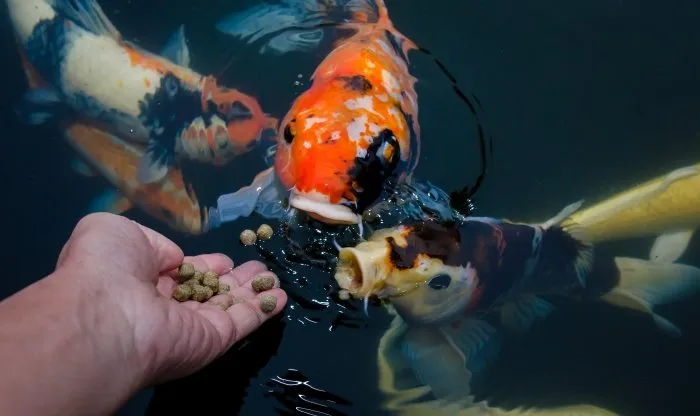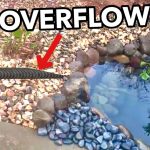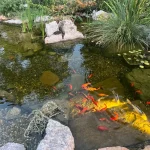If you have a pond in your backyard, you likely enjoy watching the fish swim gracefully in the water. To keep your pond fish healthy and thriving, it’s crucial to provide them with a balanced and nutritious diet. In this guide, we will explore the best foods to feed pond fish to ensure they remain happy and vibrant.
The Importance of a Proper Diet for Pond Fish
Feeding your pond fish a well-rounded diet is essential for their overall health and well-being. Just like any other living creature, fish require a balanced combination of proteins, fats, carbohydrates, vitamins, and minerals to thrive. By providing your pond fish with the right nutrition, you can help them maintain a strong immune system, vibrant colors, and optimal growth.
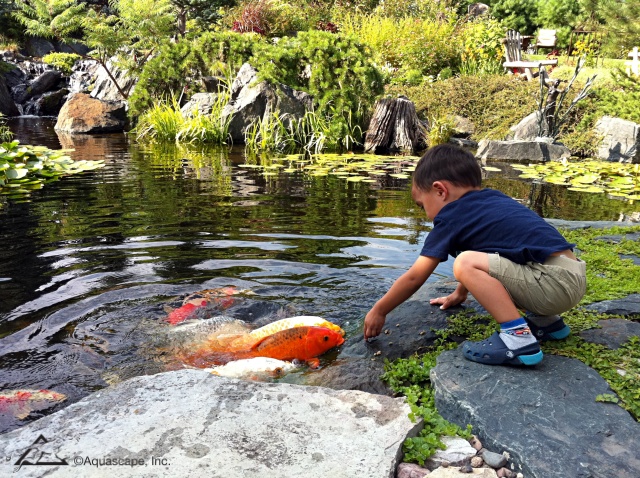
Credit: www.aquascapeinc.com
Types of Food for Pond Fish
There are several types of food options available for feeding pond fish. Let’s take a look at some of the most common and recommended choices:
1. Commercial Fish Food
Commercial fish food is a convenient and widely available option for feeding pond fish. These pellets or flakes are specially formulated to meet the nutritional needs of different types of fish. When selecting commercial fish food, opt for high-quality brands that contain a balanced mix of proteins, fats, and vitamins.
2. Live Foods
Live foods such as earthworms, insects, and small crustaceans can provide a natural and enriching diet for pond fish. These foods are high in protein and can stimulate the fish’s natural hunting instincts. However, be cautious when introducing live foods to your pond to prevent overfeeding and water quality issues.
3. Vegetables And Fruits
Some pond fish species, such as koi, enjoy munching on vegetables and fruits. Offer treats like peas, lettuce, cucumber slices, and watermelon in small quantities to add variety to their diet. These foods are rich in vitamins and fiber, promoting digestion and overall health.
4. Homemade Fish Food
If you prefer a DIY approach, you can create homemade fish food using a combination of ingredients such as fish fillets, shrimp, vegetables, and gelatin. By making your own fish food, you can customize the recipe to cater to the specific dietary needs of your pond fish.
Feeding Guidelines for Pond Fish
Proper feeding practices are crucial to maintaining a healthy pond ecosystem. Here are some essential guidelines to keep in mind when feeding your pond fish:
- Feed your fish small amounts multiple times a day rather than one large feeding to prevent overeating and water pollution.
- Monitor the fish closely while feeding to ensure that all fish have access to food and that there is no aggression during feeding.
- Remove any uneaten food from the pond after feeding to maintain water quality and prevent potential health issues.
- Adjust the amount of food based on the water temperature, as fish metabolism slows down in colder temperatures, requiring less food.
- Rotate between different types of food to provide a diverse and balanced diet for your pond fish.
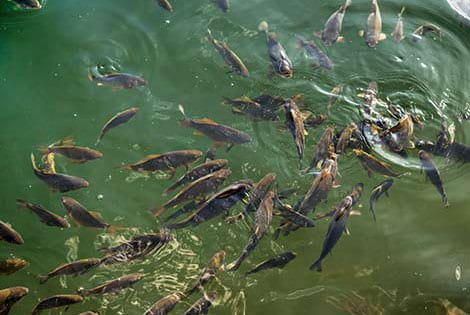
Credit: www.thepondguy.com
Seasonal Feeding Considerations
As the seasons change, the nutritional needs of pond fish also vary. Here are some seasonal feeding considerations to keep in mind:
Spring
In the spring, pond fish become more active as the water temperature rises. Start feeding your fish small amounts of high-protein food to support their increased metabolic rate and growth.
Summer
During the summer months, pond fish are typically more active and require a well-rounded diet to sustain their energy levels. Offer a mix of proteins, carbohydrates, and vitamins to keep your fish healthy and vibrant.
Fall
As temperatures begin to drop in the fall, gradually reduce the amount of food you feed your pond fish. This helps prevent overeating and digestive issues as fish prepare for the colder winter months.
Winter
In the winter, pond fish metabolism slows down, and they require less food. Feed your fish sparingly with easily digestible foods to prevent bloating and maintain water quality during the dormant period.
Conclusion
Providing your pond fish with a nutritious and varied diet is essential for their health and well-being. By choosing the right foods and following proper feeding practices, you can ensure that your fish thrive in their aquatic environment. Remember to monitor your fish closely, adjust feeding amounts based on the season, and maintain water quality to create a thriving pond ecosystem.


